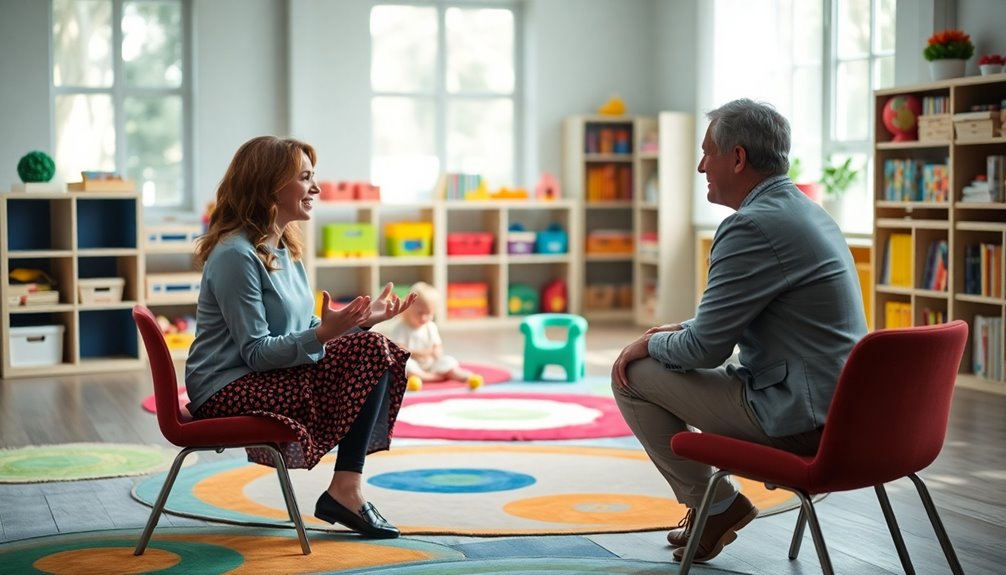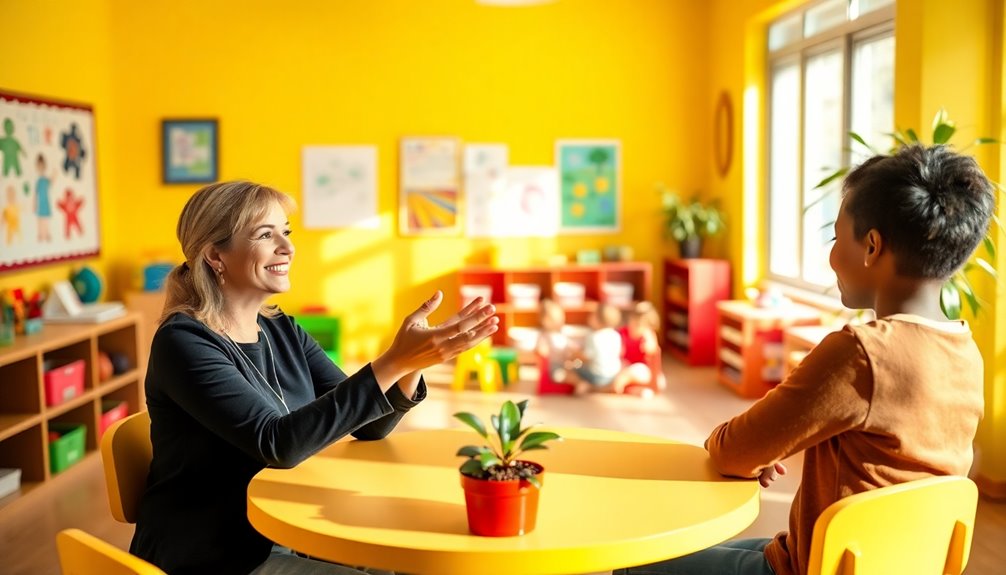To reveal daycare teacher interview insights, start by anticipating common questions about your qualifications, teaching experience, and future aspirations. Expect to discuss your favorite children's books, motivation for working with young kids, and how you engage them through hands-on, interactive methods. Emphasize your teaching style and strategies for handling challenges like maintaining attention and managing behavior. Being ready to share personal anecdotes or support strategies for struggling students will showcase your adaptability and commitment. Discovering deeper insights into your philosophy and experiences will set you apart as a candidate. Keep exploring these significant aspects to boost your interview success.
Key Takeaways
- Prepare to discuss your educational background and how it relates to early childhood education roles.
- Reflect on your teaching style, including hands-on methods and how you engage children effectively.
- Be ready to share strategies for supporting struggling students and maintaining a positive learning environment.
- Anticipate questions about your favorite children's books to demonstrate your connection to early childhood literature.
- Consider your long-term goals and how they align with the daycare's mission and vision for the next five years.
General Interview Questions

When preparing for a daycare teacher interview, you'll want to anticipate a variety of general questions that can set the tone for the conversation.
Expect inquiries about your educational background, as interviewers often seek to understand your qualifications. They might also ask about your vision for the next five years—a chance for you to share your long-term aspirations.
Be prepared to discuss your favorite children's books, as this reveals your connection to early childhood literature. Additionally, you might need to describe yourself in five words, giving insight into your personality.
Finally, sharing your interests outside the classroom can help interviewers gauge your balance between work and personal life.
These questions help create a well-rounded picture of you as a candidate.
Evaluating Teaching Experience

In evaluating your teaching experience, it is crucial to reflect on what drew you to work with daycare-level students. Consider your previous roles and the specific age group you've taught. Think about the enjoyable aspects of working with young children, as well as the challenges you've faced.
Here's a simple table to help you organize your thoughts:
| Aspect | Enjoyable Elements | Challenges Faced |
|---|---|---|
| Interaction with Children | Building relationships | Maintaining attention |
| Curriculum Development | Creating engaging activities | Adapting to varied levels |
| Classroom Environment | Fostering creativity | Managing disruptive behavior |
| Professional Growth | Learning from peers | Time constraints |
Understanding Teaching Styles

Reflecting on your teaching experience naturally leads to a deeper understanding of your teaching style. You might find that your approach combines elements like hands-on learning, structured routines, or a nurturing atmosphere.
Identifying your style helps you create an engaging environment tailored to your students' needs. You could focus on play-based methods, emphasizing exploration and creativity, or adopt a more traditional approach with structured lessons.
Consider how you motivate students—do you use praise, rewards, or collaborative activities? Understanding your style aids in overcoming challenges, like maintaining attention or encouraging participation.
Ultimately, recognizing your unique teaching style allows you to connect meaningfully with your students and fosters a positive learning experience.
Exploring In-Depth Insights

Diving into in-depth insights allows you to uncover the nuances of effective daycare teaching. When you ask targeted questions, you can reveal a candidate's unique experiences and perspectives.
For instance, understanding how they identify and support struggling students can highlight their adaptability. Explore their strategies for encouraging creativity and engagement, as these qualities are essential in a daycare setting.
Additionally, inquire about their personal teaching philosophy and how it shapes their daily interactions with children. By delving into their past experiences and specific challenges faced, you'll gain a clearer picture of their capabilities.
Ultimately, these insights not only inform their teaching style but also demonstrate their commitment to fostering a nurturing learning environment.
Engaging Students Effectively

Engagement is essential for fostering a vibrant learning atmosphere in daycare settings. To capture young children's attention, you can incorporate interactive activities like songs, games, and storytelling.
Vary your teaching methods to cater to different learning styles; some kids thrive in hands-on projects, while others may prefer visual aids. You'll find that using arts and crafts not only sparks creativity but also helps solidify concepts.
Encourage active participation by asking open-ended questions and allowing children to express their thoughts. Additionally, maintain a positive and energetic demeanor, as your enthusiasm can be contagious.
Passion and Motivation in Teaching

Your enthusiasm for teaching can greatly influence your students' motivation and overall learning experience. When you show a genuine passion for your subject, it sparks curiosity and excitement in your young learners.
Your positive energy creates a vibrant classroom atmosphere, encouraging children to engage and explore. It's important to connect emotionally with your students, as this bond fosters a safe environment where they feel valued and inspired to learn.
Addressing Childcare Challenges

Addressing the challenges of childcare requires a keen understanding of the unique needs of young children.
You'll often face difficulties in maintaining their attention, as distractions abound in a busy environment. It's essential to recognize that each child has their own behavioral patterns and developmental pace. Implementing a variety of engaging activities helps keep their focus and fosters learning.
You might also encounter variability in behavioral issues, so having strategies in place to address these will prove beneficial. Understanding childhood development principles will guide you in creating a supportive atmosphere.
Fostering Collaboration With Parents

Building strong relationships with parents is essential for creating a supportive learning environment for young children. You can foster collaboration by maintaining open lines of communication. Regularly share updates on their child's progress, and encourage parents to share insights about their child's interests and behaviors at home.
Establishing trust is key; listen actively to their concerns and feedback, and show empathy. Organizing family engagement activities, like workshops or playdates, can strengthen connections too. Additionally, incorporating serve and return interactions in your communication can enhance child development by promoting responsive relationships.
Frequently Asked Questions
What Qualities Make a Daycare Teacher Stand Out?
To stand out as a daycare teacher, you need a blend of patience, creativity, and strong communication skills. Your ability to connect with children and understand their needs is essential.
Cultivating a nurturing environment fosters trust and encourages learning. Being adaptable helps you manage diverse behaviors effectively.
Plus, your passion for early childhood education shines through, inspiring both children and colleagues. Embracing continuous learning keeps your teaching methods fresh and engaging.
How Do You Handle Stress in a Daycare Environment?
Handling stress in a daycare environment requires you to stay organized and maintain a positive mindset.
You can prioritize tasks, take short breaks, and practice deep breathing techniques when things get overwhelming. Engaging with the children and their laughter can also lighten your mood.
Additionally, sharing your experiences with colleagues can foster support and camaraderie, helping you navigate challenges together while keeping the atmosphere light and focused on the children's needs.
What Role Does Cultural Sensitivity Play in Teaching?
Cultural sensitivity plays an essential role in teaching, especially in diverse classrooms. It helps you understand and respect each child's background, promoting inclusivity.
When you incorporate culturally relevant materials and activities, you engage students more effectively. Recognizing different perspectives fosters a sense of belonging, enhancing their learning experience.
It also encourages open discussions, allowing children to express themselves. By being culturally sensitive, you're not just teaching; you're building a supportive community for everyone.
How Do You Incorporate Family Values in Your Teaching?
Incorporating family values into your teaching creates a nurturing environment.
You can share stories that reflect diverse family traditions, encourage students to express their backgrounds, and invite families to participate in classroom activities.
By celebrating cultural holidays together and integrating family traditions into lessons, you foster a sense of belonging.
You're not just teaching; you're building connections that honor each child's unique heritage and values, enhancing their learning experience.
What Is Your Approach to Professional Networking in Education?
When you think about professional networking in education, focus on building genuine relationships.
Attend workshops, conferences, and local events to connect with other educators. Use social media platforms to share ideas and resources.
Collaborate with colleagues on projects, and don't hesitate to reach out to peers for advice or support.
Keep communication open and be willing to share your experiences; it'll help create a robust network that benefits everyone involved.
Conclusion
As you step into your interview, remember that you're not just showcasing your skills; you're planting seeds of potential in the minds of young learners. Each question is a chance to let your passion blossom, revealing the vibrant garden of creativity and care you can cultivate. Embrace this opportunity with confidence, knowing that your unique approach can nurture the growth of every child. With the right insights, you'll transform challenges into stepping stones, paving the way for a brighter future.









